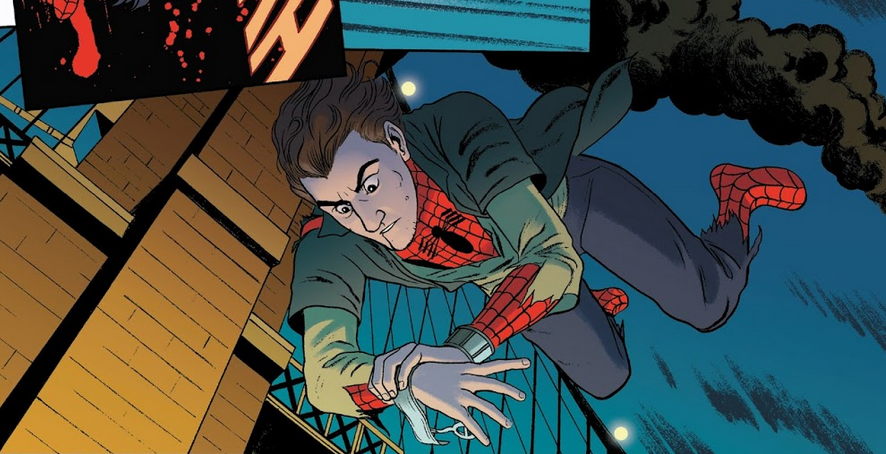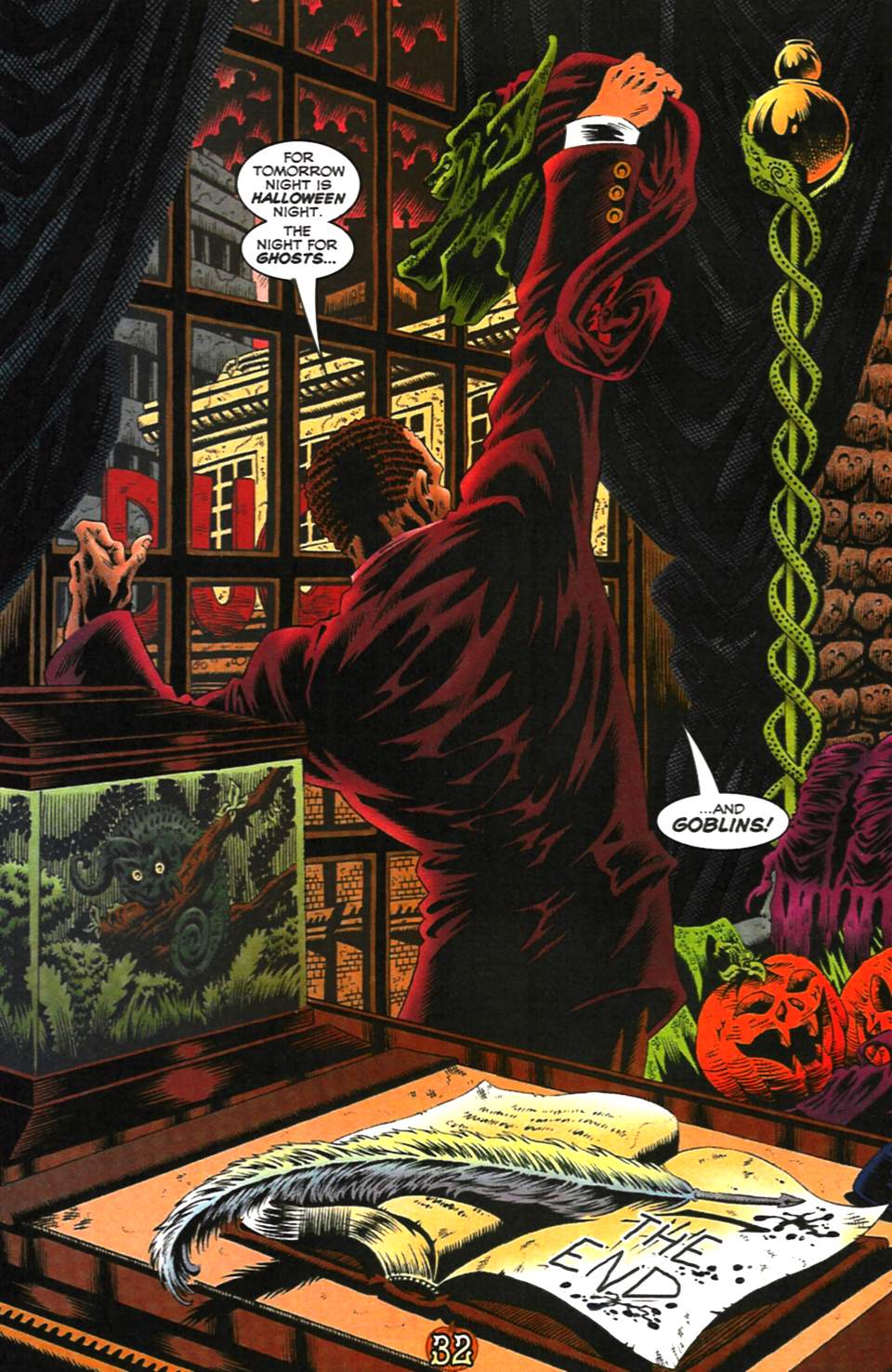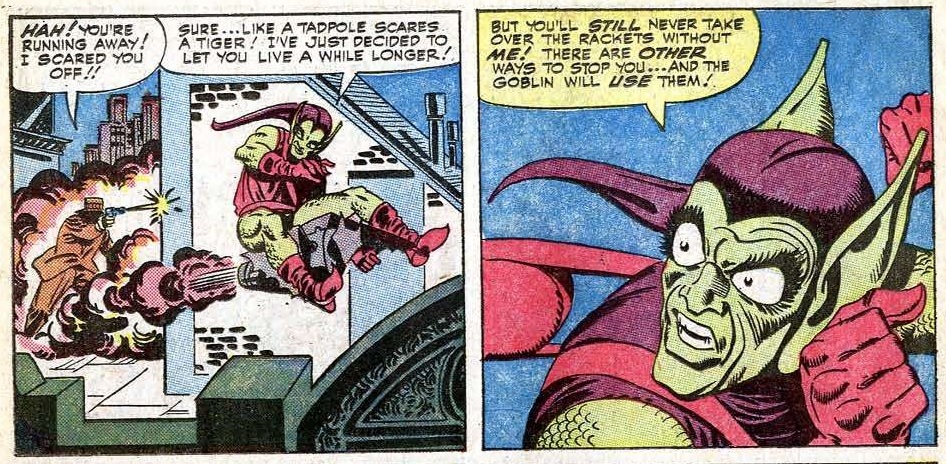In this installment we begin examine some tangential arguments relating to Venom’s origins in ASM #300. Starting with the theme of power.
There were numerous side points I wished to make in the main parts of this essay series. However since they would have derailed my central arguments or else didn’t really address the central questions I proposed I cut them out.
But I didn’t want to simply throw them away or present them altogether out of the context of this series. If nothing else I feel they do provide some food for thought if not help to more broadly explain aspects of ASM #300 and Venom’s depiction within its pages.
As such starting with this article I am including them in a series of appendixes posts.
Power Trip

An overlooked but vital element to Brock’s character in ASM #300 is his callousness and general attitude towards violence.
When it comes to violent acts (or even just the prospect of them) Brock reacts with humorous, delight or at times nonchalance.




I’m not suggesting Brock was always like this. Rather I think he developed these approaches towards violence from a few potential places.
The easiest explanation for it would be that his actions and attitudes are all part and parcel of his continued delusional state. He’s so out of touch with reality he no longer can perceive the horror or immorality of his violent acts.
Potentially his attitude is an outgrowth of his long-term furious workout regime where he visualized himself performing violent acts on Spider-Man over and over again as he obsessively exercised.
Visualization can have a powerful effect upon one’s actions and mind, especially when done repeatedly and with such fervour as in Brock’s case. Remember he was motivating himself whilst working out by looking at pictures of the person he hated and wanted to murder.*
However I’d suggest the more likely (or most prominent) explanation is that upon bonding with the symbiote and very abruptly acquiring raw, tangible physical power Brock went on a massive power trip. Such an experience would’ve helped to further fuel his delusional desire for revenge and have exacerbated any pre-existing narcissistic. Evidence of the latter can be glimpsed from Brock’s proclamations over his journalistic skills and respected position within the news business.
In short, finding himself with a lot of power very quickly would have grossly inflated his ego. In truth the same could be said of far more mentally and emotionally stable individuals in the real world. One need only look at the way so many people in the real world wield even the small amounts of power they possess. There is even a history of precedence for this within Spider-Man’s narrative.
After all, many of Spider-Man’s villains have had their egos explode once they acquired super powers. Doctor Octopus is a prime example if one were to re-read his debut in Amazing Spider-Man #3. Following the laboratory accident that bonded him to his mechanical tentacles Otto Octavius deduced that his doctors are jealous of him and upon freeing himself declared himself the supreme being of Earth.


Whilst Doc Ock might be excused on the grounds that his origin was created in the 1960s a story from 2000, ‘Revenge of the Green Goblin’ presents a similar take on Norman Osborn’s origin. In the course of the story Norman Osborn stated that he felt himself above mortal men by virtue of his newfound super strength and intelligence.


In fact Spider-Man’s first appearance depicted him going on, if not a power trip, then at least a radical inflation of his ego upon gaining his own powers. He talked about how much better the powers now make him and how above the mockery of his peers or petty concerns for other he was. This is even featured on the cover of his first appearance.



As I talked about above, a power trip would be natural for most human beings. Indeed having superior physical power is a dream and desire ingrained into the collective consciousness of all mankind. It is a very big reason why we have mythic figures such as Hercules, Sampson and even our modern day superheroes. And those with power (physical or otherwise) often times feel it entitles them to assert their wills and dominate others simply because they have the means to do so. Might makes right.
Power trips can prove particularly poignant for individuals who’ve lived with a sense of helplessness/powerlessness in some way in their lives (especially if their new power is physical in nature). Such people who obtain power will almost inevitably see their egos inflated and this could include a presumption in (and further entrenching of) their own righteousness. Part of that could involve a tweaking of the facts (or their perception of them) to suit themselves.
In the wake of the Sin Eater scandal Brock had lost his career and with it the ‘power’ he could assert as a journalist. He was forced to seek out work from writing drivel he found repugnant and demeaning, living in a rundown area. And to him all this happened because some jerk butted into something that wasn’t his business. Compounding matters, that person was nothing less than some anonymous, inhuman ‘hero’ with powers beyond mere mortals. This meant someone like Brock (one of those ‘mere mortals’) had little hope of exacting any kind of retribution. Eventually Brock was in such despair he seriously considering ending his own life.
Under these circumstances I think it’s safe to say Brock would have felt incredibly powerless. So when the symbiote abruptly gave him powers similar (and superior) to his perceived victimizer there would’ve been an inevitably adverse affect upon his mind, actions perceptions of his whole life.
His new raw physical power gave Brock the ability to indulge his violent inhibitions and by extension likely made him feel (like Norman Osborn) that the usual constraints of society no longer applied to him. This explains his violent actions as an outlet for his rage along with his joy, twisted humour and casual attitude in relation to those acts.
When it comes to Spider-Man Brock was also handed another form of power. He had the knowledge of his foe’s secret identity and the power to render Spidey’s greatest defence (the Spider Sense) utterly useless. Quite apart from his new found physical strength, speed and endurance, these two weapons on Brock’s arsenal are particular potent. Not only could he exert superior strength over Spider-Man but he could attack him without him ever knowing. Coupled with knowledge of Spidey’s identity he could also invade his privacy which in the real world is another form of power and one incredibly tempting to many people.
One need only look at every hacking and intelligence scandal of the past decade for proof of this. Indeed Brock’s profession as a journalist likely meant that the ability to invade Spider-Man’s private life covertly would’ve been especially stimulating to his ego and sense of power. After all learning about people’s lives and uncovering secrets (even against people’s wills) is part of a journalist’s job.
Additionally Brock’s ego could’ve been further inflated by virtue of how unique (to him) the ability to bypass the Spider Sense and the knowledge of Spidey’s identity was. Often when people are privy to a very private secret it can lend a sense of ‘specialness’ to them. This would go further if the secret is the answer to a mystery a lot of people are curious about. As numerous stories throughout the decades (particularly the 2006 Civil War event) have shown, Spider-Man true identity is the subject of much national (and even international) interest. Being handed the answer to that great mystery would inevitably inflate many people’s ego, in particular if they believed themselves to be the only person (or one of the few people) to possess such knowledge. They would know something that nobody else knew but had been incredibly curious about for years, which would again feel particularly gratifying to a former investigative journalist like Brock.
To a much lesser extent there would likely have also been a certain mystique surrounding his Spider Sense. Though the public are to a large extent aware of its existence its Spider-Man’s most mysterious and exotic ability, even he isn’t entirely aware how it works. Brock believing himself to not only power to physically dominate Spider-Man (something many other people possess) but also the exclusive ability to neutralize Spidey’s most mysterious ability and greatest defence would’ve enhanced his already delusional and inflated sense of ego.
And just in case you find these arguments too speculative ASM #300 itself hints at the idea that Brock’s mind was affected by his newfound power. At the conclusion of his flashback Brock emphasised the power the symbiote possessed, even using the word power twice!

After being handed the means to free himself from his wretched situation and make his violent fantasies reality Brock became akin to a kid in a car on their way to Disneyland; excited and delighted at the prospect of getting to make their dreams come true. This is rather nicely reflected in ASM #317 (also by Michelinie) when Venom expresses his delight at the prospect of Spider-Man’s imminent death by repeating the word ‘happy’ to himself.

Granted Brock’s twisted sense humour could have just been his own peculiar brand of dark humour, or else a by-product of his experience as a journalist. After all in his job he might have needed to be witty or funny at times so coupled with his dark humour he just comes off more violent and twisted than he actually is.
However I think it makes much more sense that his attitude towards violence is more poignantly tied to what I discussed above. In his mind the rules of regular society and ‘lesser people’ (i.e. weaker non-super powered people) no longer applied to him. His power (and his ‘suffering’) put him above all that meaning everything he did was justified. It just didn’t matter if some people got hurt along the road to his personal gratification.
That’s all for now. Next time we will look at several different concepts related to Venom, perhaps most prominently the importance of religion to the character.
*It is also likely that his constant visualization of Spider-Man’s violent death likely desensitized him to the idea of violence to some extent.









